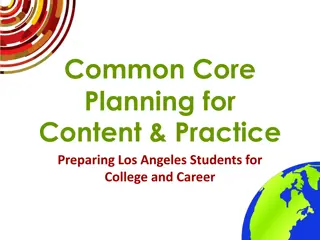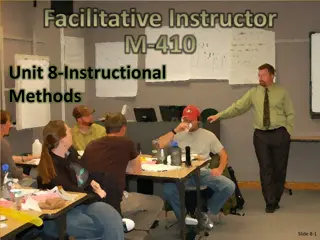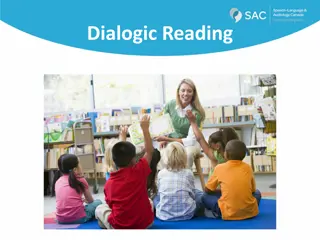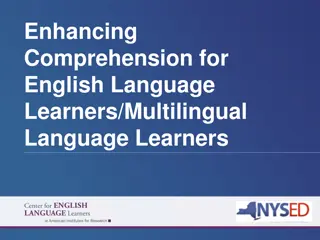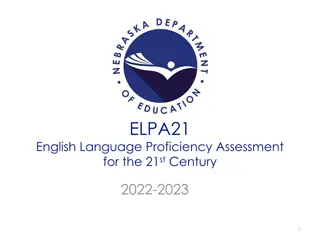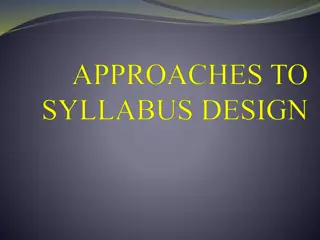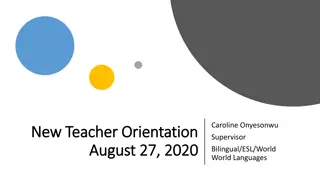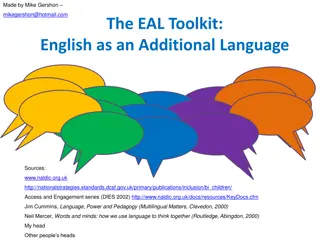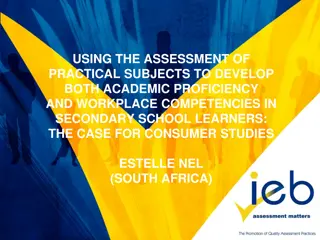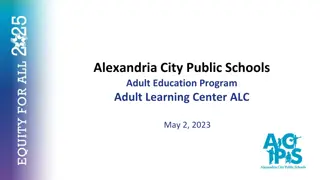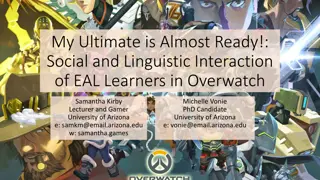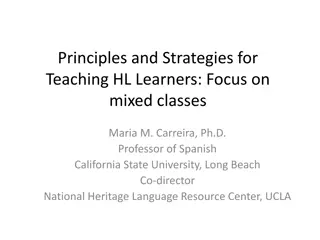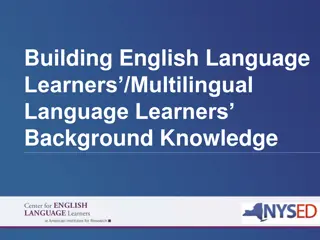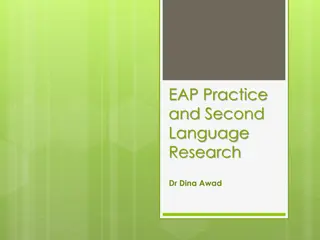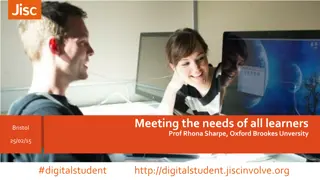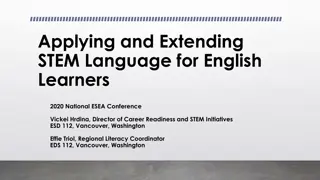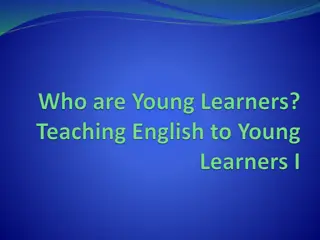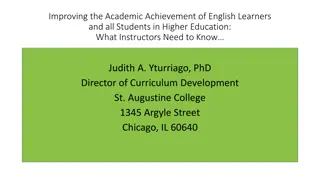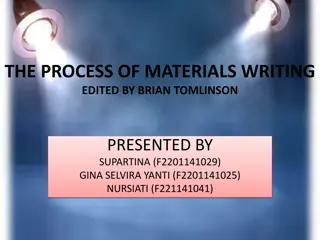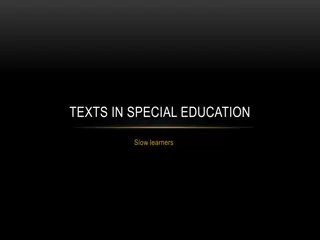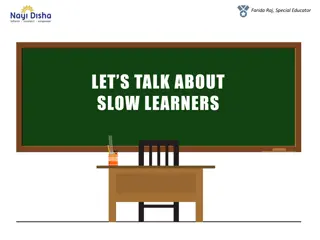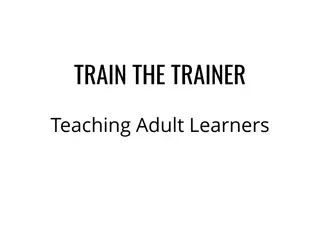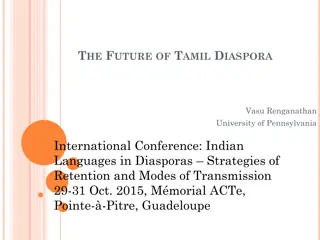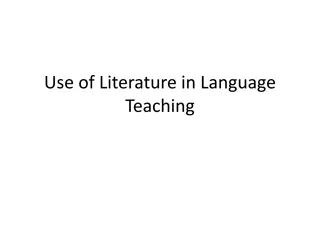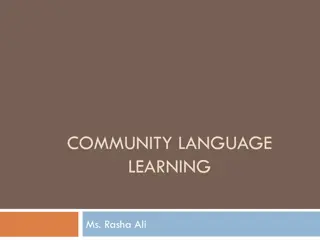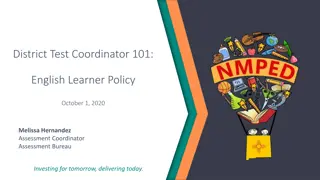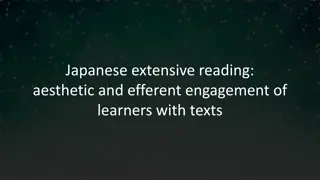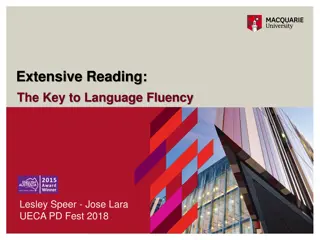Supporting Transitions for Autistic Learners in Scottish Education
This professional learning module focuses on supporting autistic learners in Scotland through effective transitions. Topics covered include terminology, the Scottish context for autism and inclusion, understanding autism, assessment and monitoring, supporting learners and families, social and emotio
0 views • 21 slides
Understanding Translation: Key Concepts and Definitions
Translation involves transferring written text from one language to another, while interpreting deals with oral communication. Etymologically, the term "translation" comes from Latin meaning "to carry over." It is a process of replacing an original text with another in a different language. Translat
11 views • 76 slides
Enhancing Common Core Aligned Math Lessons for Los Angeles Students
Plan and implement Common Core aligned problem-based math lessons using John Van de Walle's Three-Phase Structure to prepare Los Angeles students for college and career success. Explore strategies to cater to diverse learners such as English learners, Standard English learners, Students with Disabil
4 views • 23 slides
Online Language Tutoring Market - Global Opportunity Analysis
Online Language Tutoring Market by Learning Mode (One-on-one, Group), Age Group (<18 Years, 18\u201320 Years), Language, End User (Individual Learners, Educational Institutes, Government Bodies, Corporate Learners), and Geography - Global Forecast to 2030
1 views • 4 slides
Effective Instructional Methods for Adult Learners
Explore six effective instructional methods for adult learners, including advantages and limitations of each. Learn how to mitigate behavior problems associated with adult learners. Discover appropriate methods for teaching first aid, FireWise principles, disseminating policy information, and discus
0 views • 13 slides
Pedagogical Shift in Physical Science: Constructing Knowledge Through Learner-Centered Experiences
There is a significant pedagogical shift in physical science education from viewing science as a fixed body of knowledge to emphasizing the process of constructing knowledge. Learners are now placed at the center stage, engaging in inquiry-based learning, critical thinking, and collaborative interac
3 views • 21 slides
Comprehensive Guide to Dialogic Reading for Language Development
Dialogic Reading is a systematic activity where an adult and child engage in shared reading, focusing on building oral language through interactive techniques like reading aloud, storytelling, and making connections with the child's experiences. This method enhances vocabulary, language skills, and
1 views • 26 slides
Enhancing Comprehension for English Language Learners/Multilingual Language Learners
This presentation focuses on scaffolding English language arts instruction to enhance comprehension for English Language Learners (ELLs) and Multilingual Language Learners (MLLs). It covers strategies like close reading, building background knowledge, and vocabulary development. The goal is to suppo
0 views • 73 slides
ELPA21 - English Language Proficiency Assessment Overview
ELPA21 is a comprehensive language proficiency assessment system for English Learners in Nebraska, featuring a dynamic screener and summative tests. The system includes components like the Home Language Survey and various assessments to identify and support English Learners throughout their K-12 edu
1 views • 12 slides
Scaffolded Reading Activities for Language Learners
These scaffolded reading activities for language learners include gapped sentences, mixed tenses exercises, and a variety of text-related tasks to enhance reading comprehension and language skills. Activities cover phrasal verbs, dependent prepositions, comparatives/superlatives, modals, and past te
0 views • 19 slides
Understanding Language Teaching Syllabus: Integration, Theory, and Approaches
Language Teaching Syllabus involves the integration of subject matter and linguistic elements, guided by theories of language and learning. Various approaches like Grammatical, Situational, Communicative, and Analytic are used to structure syllabi. Breaking language into parts aids in sequential lea
1 views • 28 slides
New Teacher Orientation - Supporting Multicultural Education and English Language Learners
The new teacher orientation session led by Supervisor Caroline Onyesonwu on August 27, 2020, focused on supporting multicultural education and English Language Learners (ELLs). The agenda included activities like exploring one's multicultural self, discussing ELL student placement and language profi
1 views • 18 slides
Support Strategies for English Language Learners in the Classroom
Explore effective strategies for supporting English language learners (ELLs) in the classroom, including buddy systems, picture rules, and the use of dictionaries. These strategies aim to enhance communication, engagement, and overall learning outcomes for ELLs as they navigate language barriers and
0 views • 54 slides
Enhancing Academic Proficiency and Workplace Competencies in Secondary School Learners through Consumer Studies Assessment
In South Africa, the National Senior Certificate (NSC) and the Independent Examinations Board (IEB) play crucial roles in assessing learners' academic proficiency and workplace competencies. Consumer Studies, as an elective subject, is integral in developing responsible consumer behavior and equippi
1 views • 23 slides
Alexandria City Public Schools Adult Education Program Overview
The Alexandria City Public Schools Adult Education Program offers a variety of opportunities for adult learners, including English Language Learners and General Education Development classes. With day and evening programs available at different locations, individuals can enhance their academic skill
0 views • 6 slides
Social and Linguistic Interaction of EAL Learners in Overwatch
Exploring the unique communication challenges and opportunities for English as an Additional Language (EAL) learners in the multiplayer hero shooter game, Overwatch. The study focuses on the team dynamics, language learning affordances, and social interactions within the game, shedding light on the
0 views • 17 slides
Supporting English Second Language Science Learners at University of Limpopo
Developing materials for L2 science learners at University of Limpopo to support previously disadvantaged English second language science learners. The program aims to help students succeed in Maths and Sciences, enabling more black students to enter science-based programs. Focus on improving Englis
3 views • 34 slides
Teaching Strategies for Heritage Language Learners in Mixed Classes
Explore essential concepts in teaching heritage language learners in mixed classes, focusing on project-based teaching. Understand the characteristics of native speakers, heritage speakers, and second language learners. Learn about the motivations of heritage language learners and the implications f
1 views • 48 slides
Effective Strategies for English Language Learners/Multilingual Learners
Welcome to the presentation series sponsored by the New York State Education Department Office of Bilingual Education and World Languages. This first presentation focuses on building background knowledge to support teachers in scaffolding English Language Arts instruction for ELLs/MLLs. Discover met
0 views • 43 slides
Insights into Second Language Learning Research
This presentation delves into various aspects of second language learning research, including the use of dictionaries, part-of-speech explanation, grammatical rules, and bilingual dictionary use. Studies show mixed results on the effectiveness of meta-analysis in form-focused instruction and the imp
0 views • 26 slides
Meeting the Needs of All Learners in the Digital Environment in Further Education
Prof. Rhona Sharpe from Oxford Brookes University discusses how learners experience the digital environment in further education, highlighting the importance of meeting the diverse needs of learners. The content covers various aspects such as vocational backgrounds, prior educational/work experience
0 views • 13 slides
Engaging Pronunciation Activities for Language Learners
Engage language learners with activities like shadow reading, tongue twisters, and "Have You Ever..." to improve pronunciation, stress, and intonation. These interactive tasks involve listening, speaking, and group participation, making the learning process challenging and enjoyable at any level. By
0 views • 14 slides
Exploring Sociolinguistics: Language Variation and Social Factors
Sociolinguistics delves into the study of language variation influenced by social factors, examining the relationship between language and its social context. It explores various aspects like standard pronunciation, language choice, speech acts, language components, language variety, and factors suc
0 views • 73 slides
Enhancing Language Learning in STEM Education for English Learners
Explore the importance of incorporating language skills in STEM education to support English learners. Gain insights on fostering multilingual skills, understanding STEM vocabulary, and promoting cultural competence in the learning environment. Enhance connections between language, science, and engi
0 views • 38 slides
Understanding Age-Related Differences in Language Learning
Age plays a crucial role in language teaching and learning, with different age groups demonstrating varying learning needs, competencies, and cognitive skills. Young learners, typically ranging from 6 to 12 years old, have distinct characteristics such as shorter attention spans, a preference for pl
0 views • 11 slides
Understanding Assembly Language Programming for Computing Layers
Assembly language is a low-level programming language that enables direct interaction with a computer's hardware components. This content explores the fundamentals of assembly language, the relationship between human-readable machine language and binary code, an assembly language program for multipl
0 views • 31 slides
Understanding Language Anxiety in Foreign Language Learning and Teaching
Explore the impact of language anxiety on students and teachers in foreign language learning and teaching contexts through insights from Dr. Christina Gkonou's research. Delve into the theoretical background, implications for language education, and real-life experiences shared at the Essex Language
0 views • 25 slides
Enhancing Academic Achievement of English Learners in Higher Education
Explore strategies for instructors to improve the academic performance of English learners in higher education. Topics cover different types of English learners, bilingualism, social vs academic language, effective teaching practices, and the importance of emotional support in language learning moti
0 views • 15 slides
Issues and Insights in Materials Writing for Language Learning
Problems and perspectives in materials writing for language learning are explored through the lens of educators and learners, highlighting challenges and cultural considerations in creating effective language resources. From addressing real-world language needs to navigating cultural nuances, the pr
0 views • 52 slides
Understanding Slow Learners in Special Education
Slow learners are individuals who take longer to grasp concepts and struggle with traditional academic demands. They are not disabled but may lack interest in conventional educational systems. It is important not to confuse slow learners with students needing special education or those who are non-c
0 views • 4 slides
Understanding Slow Learners: Characteristics, Signs, and Support Strategies
Learn about slow learners through the perspective of Farida Raj, a special educator. Discover the characteristics and signs of slow learners, such as difficulties in grasping abstract concepts, poor self-image, and slow task completion. Find out how to spot the signs and provide necessary support th
0 views • 14 slides
Understanding Learner Styles and Strategies
Learner styles and strategies play a crucial role in education. There are two main types of learners - Analytic Learners who focus on details first, and Holistic Learners who prefer understanding the whole concept. Analytical learners excel at recalling facts, excel in math and science, and are good
0 views • 37 slides
Understanding Adult Learners: Key Characteristics and Strategies
Characteristics of adult learners include being goal-oriented, self-directed, valuing past experiences, desiring respect, and having established habits and opinions. Understanding these traits is essential for effective teaching and training. Adult learners seek practical information, immediate feed
0 views • 47 slides
Challenges and Strategies in Tamil Heritage Language Education
Delve into the complexities of Tamil heritage language education for diaspora learners, examining the diverse linguistic profiles and proposing differentiated curriculum designs to cater to various learner types. Explore the dynamics of heritage language environments and the concept of differentiate
0 views • 14 slides
Exploring Literature in Language Teaching
Literature plays a significant role in language teaching as it offers authentic materials, motivates learners, and enhances cross-cultural awareness. Literary works help develop language skills and critical thinking while providing insights into cultural aspects and artistic expressions. Various app
0 views • 27 slides
Effective Community Language Learning Method by Ms. Rasha Ali
Community Language Learning (CLL) method emphasizes understanding students' feelings and creating a supportive environment for language learning. This approach, influenced by the Counseling-Learning approach, focuses on building relationships, reducing anxiety, and promoting effective communication
1 views • 15 slides
Supporting English Language Learners in Education: Key Guidelines and Tools
Federal laws protect English learners under Title VI of the 1964 Civil Rights Act and the Equal Educational Opportunities Act of 1974. The New Mexico LUS must be completed for all new students enrolling in public schools to identify English language learners. Utilizing tools like W-APT and WIDA Scre
0 views • 21 slides
Aesthetic and Efferent Engagement in Japanese Extensive Reading
Exploring the engagement of learners with texts in Japanese extensive reading, this study delves into the varied stances of L1 speakers towards reading in Japanese. It discusses the impact of kanji on reading comprehension, the use of furigana for phonetic guidance, and challenges faced by L2 learne
0 views • 22 slides
Exploring the Importance of Extensive Reading for Language Fluency
Extensive reading plays a crucial role in language fluency development. It involves reading easy and enjoyable material at a faster pace, allowing learners to choose what they want to read. By following ten principles and a four-strands approach, extensive reading helps improve four essential langua
2 views • 14 slides
Factors Influencing Language Acquisition in Learners
Factors such as affect, motivation, self-confidence, anxiety, and attitude play crucial roles in language learners' acquisition process. High motivation, self-confidence, and low anxiety levels enhance effective language acquisition, while positive attitudes towards learning facilitate seeking and p
0 views • 10 slides


